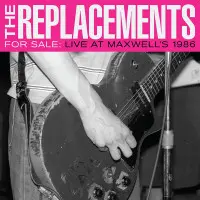In the late ‘90s while I was in high school, I was an obsessive Rolling Stone reader. At the time, the magazine was still in its large print format and occasionally contained a long form article by the likes of Hunter S. Thompson and Tom Wolfe. At some point in the album review section, there was a tiny feature that proclaimed The Replacements’ Tim a lost masterpiece. Living in the rural South and finding most new music through skate videos, I had never heard of the band but was definitely intrigued by the description of a band who had harnessed a “primal essence” and realized “the necessary failure of fun and the equally necessary drive to have it" (1). Also, once I discovered Tim was produced by Tommy (Erdelyi) Ramone, I was hooked. At the time, the Ramones’ cover of Tom Waits’ “I Don’t Want to Grow Up” from Adios Amigos was prominently featured in a 411 video, further cementing our skate group’s collective obsession with all things Ramones.
For Sale: Live at Maxwell’s 1986 captures the Replacements on tour for Tim before Bob Stinson’s drinking prompted his dismissal from the group and captures them at their raucous, feral prime. The set draws from their output to date, including Sorry Ma…, Hootenanny, Let It Be, Stink EP and the aforementioned Tim. There’s an early, alternate-lyric version of “Can’t Hardly Wait” that definitely has more muscle than the streamlined single it became on Pleased to Meet Me. Let It Be’s distorted ballad “Answering Machine” is given a tempo acceleration with full band augmentation to exponentially ratchet up its power. Due to their history of excessive inebriation, the songs are colored by rough playing, ragged vocals, and occasional stumbles that only add to the charm of the performance.
The cover songs from this set elucidate where the Replacements were horning themselves in on the rock ‘n roll continuum as a bridge between ‘60s and ‘70s rock and the frayed buzz of punk. Early in the set, they take a quick, toungue-in-cheek howl through Sweet’s glam rock ode to lust “Fox on the Run.” The aforementioned “Fox” is joined by Kiss’s “Black Diamond,” T. Rex’s “Baby Strange,” Vanity Fare’s “Hitchin’ a Ride,” and the Beatles’ “Nowhere Man.” Lennon’s screed to lost souls in a “nowhere land / making all [their] nowhere plans for nobody” is the lyrical embodiment of Midwestern despair that is at the root of all of the Replacements’ sonic rage. As with the other songs comprising the setlist, all glittery studio affectations are stripped away from these tracks, exposing the raw nerves at the core of each song.
The absolutely essential moments from this live set come from the two songs from Tim that always stirred that longing feeling that originates from small-town isolation with dreams that all the big, interesting things are happening somewhere else. “Left of the Dial” describes that never-ending search for the perfect radio signal from afar that is broadcasting music other than country and contemporary Christian. You “read about [a] band in some local page,” and as you’re driving “passin’ through and it’s late, the station [starts] to fade / [picking] up another one in the very next state.” Streaming music has several advantages over previous incarnations of music consumption, but “Left of the Dial” recalls the romantic affair of tweaking the radio knob to find that perfect transmission through the static. “Bastards of Young” wails with the frustrating “what a mess, on the ladder of success / Where you take one step and miss the whole first rung.” A more realistic, sobering take on “Born to Run” bravado where Westerberg concludes that in the strive to escape the small-town deathtrap we find “the ones who love us best are the ones we’ll lay to rest / and visit their graves on holidays at best / The ones who love us least are the ones we’ll die to please.” Despite the bleak conclusion, a defiant band pounds out the final proclamation to “Take it, it’s yours!”
For Sale captures the Replacements at the perfect point where the songwriting had matured beyond the simple directive of closer “Fuck School” to the nuanced snapshots of adult ennui, but their sound remained serrated and hadn’t suffered the major label sanitizing that would plague future releases. This set also serves as a final testament to the height of the combined talents of Westerberg, the Stinson brothers, and Chris Mars before substance-fueled excess began to render an artistic toll on the band.
